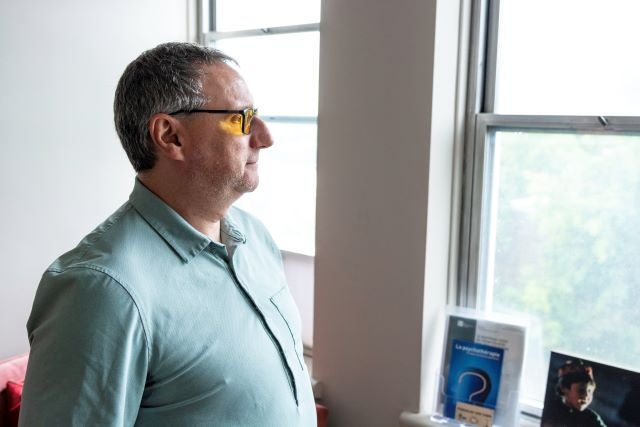Blind psychologist ‘sees’ the solutions to client problems

“It sounds clichéd, but there’s some truth in the adage, ‘the wise blind sage,’” said psychologist Josh Simmonds. “I see what my clients don’t. I pick up on cues, changes in tone - and what they aren’t saying.”
Born with retinitis pigmentosa, Simmonds became legally blind in his 40s. He feels his clients connect with his easygoing nature, and are less inhibited, particularly those with body image insecurities. “People feel more listened to when they feel they are not being seen versus having a visual bias,” he observed.
While studying psychology at Concordia and McGill University, Simmonds had difficulty seeing the board but was reluctant to share his condition with his professors. In his second year, he finally sought the support of the Office for Students with Disabilities and experienced the difference it made. Self-advocacy has since been a life-long endeavour. “Asking for accommodations does not give you an unfair advantage,” he explained. “Rather, it helps put you on an even playing field with others.” Since 2003, Simmonds has run his own psychotherapy practice. On his LinkedIn page, he prides himself on offering a “person-centered style [that] emphasizes a collaborative dialogue that is mindful of individual differences and cultural influences.”
Clients may be surprised at their first meeting when Simmonds greets them with tinted glasses and a white cane. However, he said, they soon realize it does not impact his clinical skill. If anything, it enhances his intuitive nature. “Recommendations and thoughts are taken with a bit more gravitas because I walk the walk and talk the talk,” said Simmonds.
The only time it becomes relevant, he laughed, is when it looks like he is not paying attention or misses a handshake.
Outside of the office, Simmonds is a competitive dragon boater who has represented Canada with the 22Dragons senior men’s division. With the support of the Montreal Association for the Blind and Habilitas Foundation, he co-founded the Caravela dragon boat team for individuals with vision impairment and other challenges in 2016.
This has been a particularly poignant year for Simmonds, having suffered an aortic tear in the fall of 2024. He is back on the water thanks to the support of his dragon boat family.
His next project is writing an autobiography tentatively titled Feeling Seen: Memoirs of a Blind Psychologist. Other ideas include hosting a podcast showcasing practitioners with disabilities, discussing their experiences and contesting assumptions.
“Everyone has challenges they need to work through, be they visual or something more discrete,” said Simmonds. “Don’t look at them as barriers, but rather as part of the journey.”








